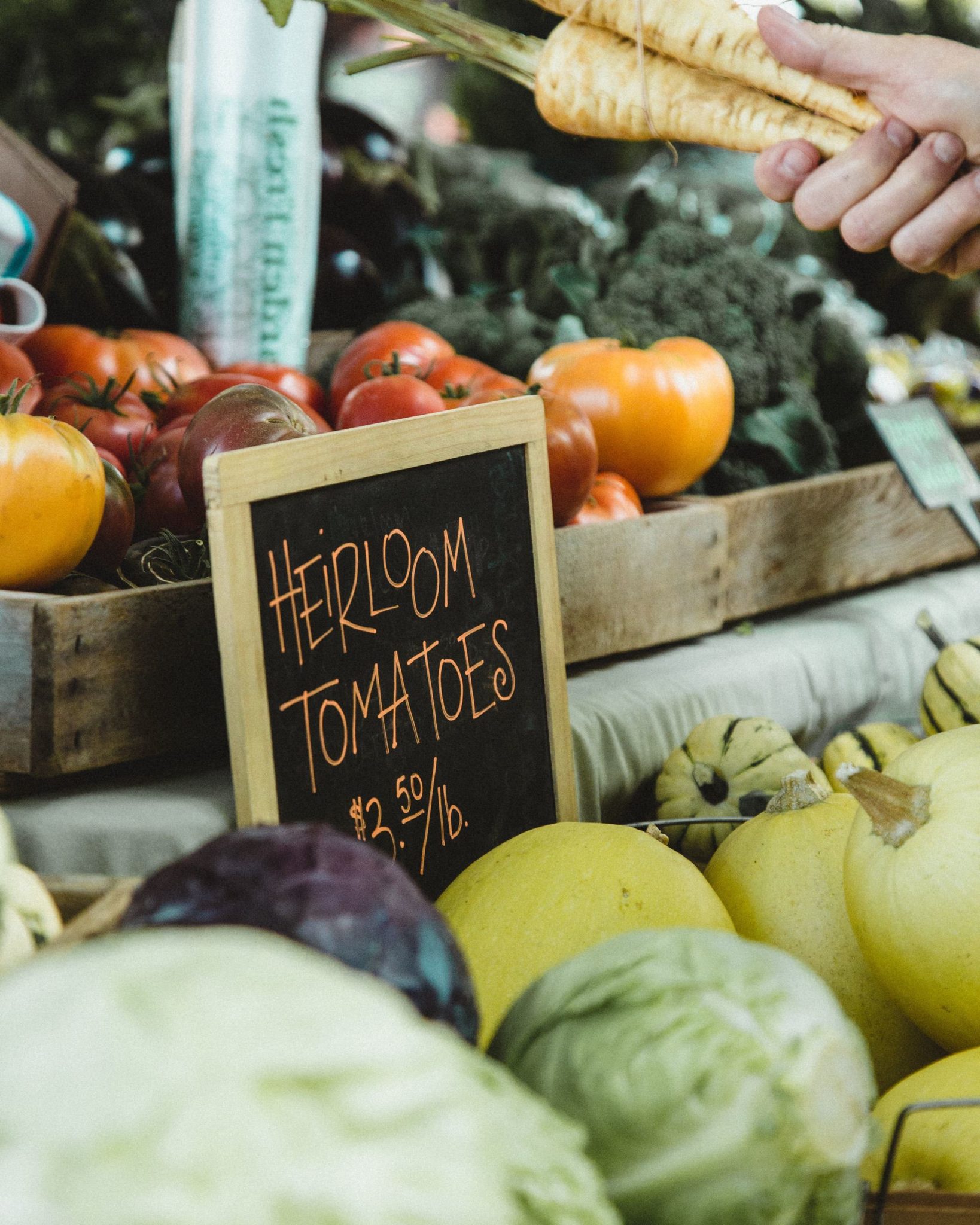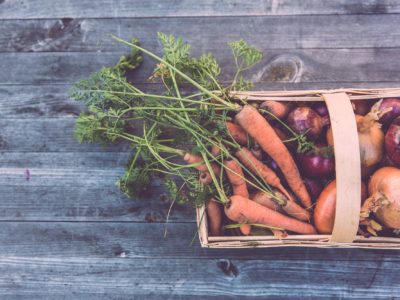Last Updated on November 3, 2022 by Rebecca Huff
Since I believe that organic foods (while not perfect) are far superior to conventional and especially genetically altered food, my goal is to purchase organic whenever possible. My great-grandparents never had to worry about going organic since modern farming methods didn't exist.
You can still go organic even if you are operating on a tight budget.
Have a plan; stay within budget
When going organic, always have a plan and stick to it. Meal planning saves money by helping you prepare the amount of food your family will eat with less waste. Using a menu plan will also help you to create meals around what's in season or on sale.
Add snack items to your meal plan and make them yourself. Not only are homemade foods tastier, but they are also healthier as well. Make things like air-popped popcorn, blondies and brownies, chocolate peanut butter balls, and your own granola bars.
Seek out nearby farmers when going organic and get to know them so you can buy local. When you shop at a farmers market, plan to visit the stalls toward the end of the day. That is when farmers are more likely to reduce the prices, so they don't have to pack it all back to the farm. Doing so means the food won't be treated with the chemicals supermarkets use for storing and shipping for extended periods of time. BONUS!
Get what you can in bulk when going organic
You can buy meat in bulk by seeking out farmers who will allow you to split beef, pork, etc. with another family to store in your freezer. Many organic food sites like Thrive Market will have staples cheaper than what you can find at the supermarket, so compare prices and know what to buy online.
You can find great deals at online meat delivery subscription services such as:
If online shopping isn't an option, consider warehouse stores like Costco for organic meat, veggies, and snacks. Some memberships pay you a percentage back on certain purchases throughout the year.
Seek out orchards and berry farms to buy in bulk or pick your own. Taking the children along to a pick-your-own blueberry farm is the best! In the town where my mom lives the Apple Barn offers apples of many varieties in bulk. Down the road, I can find blueberries, blackberries, strawberries and more.
Avoid impulse shopping
If you are an impulse buyer, consider using a service that does the shopping for you like Instacart or Kroger's click list. When I take my children with me, even when I say “don't ask for anything“, I still end up with extra items. Sometimes I'm guilty of adding things that look good to my cart or I cave when they ask for extras like kid bars or convenience foods.
Request coupons or discounts from your favorite brands. Merely asking has worked for me in the past. Just contact your favorite companies or ones you have never tried before asking for any coupons or promotions they may be offering at the time. The worst you can get is a no, but you may end up with a pocket full of coupons or even free samples. Sign up for their emails (I use a “sign up” email account that I have just for the purpose of newsletters and stores).
Social media deals
Follow your favorite brands on social media so you will be the first to know about deals they may be offering. Many companies also conduct giveaways you can enter. Consider signing up for emails from your favorite brands as well, this can be tedious to sort through, which is why I suggest you create an “extra” email account just for sign-ups. Search through your email before shopping for coupons from your favorite brands.
When you sign up for emails from ButcherBox you'll receive their exclusive member deals and flash sales emails.
Don't be duped into paying more
It happens to us all, even when we know how to read a label we can be in too much of a hurry when shopping. Mistakes happen, but most of the time we are just victims of deceptive marketing. Know how to read a label and don't pay more for items that aren't 100% organic.
Do you know the difference between “organic” and “made with organic ingredients” when you see it on a food label? I explain it in this article –> Teach your kids how to help you at the supermarket and you'll reap the rewards now and in the future. Educate yourself and don't waste money!
Know the facts about foods that are easily faked such as honey and olive oil so you do not pay more for an inferior product. Honey, for example, is often cut with corn syrup to increase profits. It takes time for the FDA to track down criminals who do this and worse. Chinese honey is banned in the US because it is commonly contaminated with an antibiotic, chloramphenicol. However, organized criminals often find ways to import it illegally.
The easiest way around this is to simply buy real honey from local bee farmers. Avoid supermarket brands of honey and buy from someone you can trust. Some beekeepers are happy to show you around, others can be found at the local farmer's market. Find a beekeeper near you by searching Bee Culture.
Locating unadulterated real extra virgin olive oil is a bit harder. First of all, olive oil grades in the US are all voluntary. If a company does choose to add the words “virgin” or “extra virgin” then they are subject to specific legal standards set by the International Olive Council. That doesn't keep illegal olive oil off the shelf. One way to detect real olive oil is to look for a harvest date; here are a few other ways to detect fake oil.
Only buy organic when necessary
You probably didn't expect to hear me say that, did you? I do not buy organic produce on items that are not susceptible to pesticides and herbicides. For example, it would be a waste to spend extra on organic avocado, since the skin is not eaten.
Bananas and avocados are thick skinned so pesticides do not penetrate into the edible parts. Although bananas are susceptible to fungus, which is why banana researchers and scientists are considering ways to genetically modify bananas. Fruits and vegetables on the “clean 15” list such as:
- avocados
- pineapples
- onions
- cabbage
- cantaloupe
- cauliflower
- grapefruit
- honeydew melons
- eggplant
- kiwi fruit
- papayas
- mangoes
- asparagus
- sweet corn
- sweet peas
When I purchase foods listed on the Dirty Dozen, I either buy organic or avoid them altogether. The pesticides used in growing these fruits and veggies are considered an unwashable danger. Rinsing pesticides off of produce is not possible as it only eliminates about 15% whereas peeling removes about 85% of pesticides but also reduces nutrition.
When buying berries, my goal is to source local, organic, and in season. Sometimes buying frozen organic berries is a better deal than fresh out of season berries. Companies flash freeze the berries right after being picked, so often the nutritional content of frozen surpasses what you will find in the produce section which may have been shipped from out of the country.
My goal is to feed my children organic during the critical stages of growth. Once they are adults, they make their own choices when it comes to food.
Organic coffee and tea is another food to consider. Do some research to help you make your decision. I prefer to buy organic teas and coffee, but I will make exceptions for some single origin coffees that aren't organic. Learn all about how to buy the best coffee beans if you truly want superior coffee!
Know what's going on politically with organics
One source of great confusion when it comes to organic is egg labeling. I recommend staying in the loop with labeling laws if you want to know you are getting what you are paying for. For example, the USDA finalized a new rule recently that
will give organic animals—and organic consumers—the higher level of welfare they deserve. Among many improvements, the new rule will specify minimum indoor and outdoor space requirements for chickens raised for eggs and meat. No longer will a small, screened porch that only a few birds can access qualify as “access to the outdoors.” The rule also requires enrichment, like dust bathing materials for birds, and restricts certain kinds of physical alterations, like tail-docking in pigs and de-beaking of chickens and turkeys. The ASPCA has been working closely with the USDA to provide input on this rule.
Stay in the loop on proposed changes to the National organic program to keep up-to-date on allowed and prohibited substances for the organic label.
How do you make going organic more affordable? I'd love to hear about it so please do share!

Sources
https://www.aspca.org/news/organic-becoming-stronger-label-victory-years-making


 Korean Lettuce Wraps
Korean Lettuce Wraps
Leave a Reply
You must be logged in to post a comment.